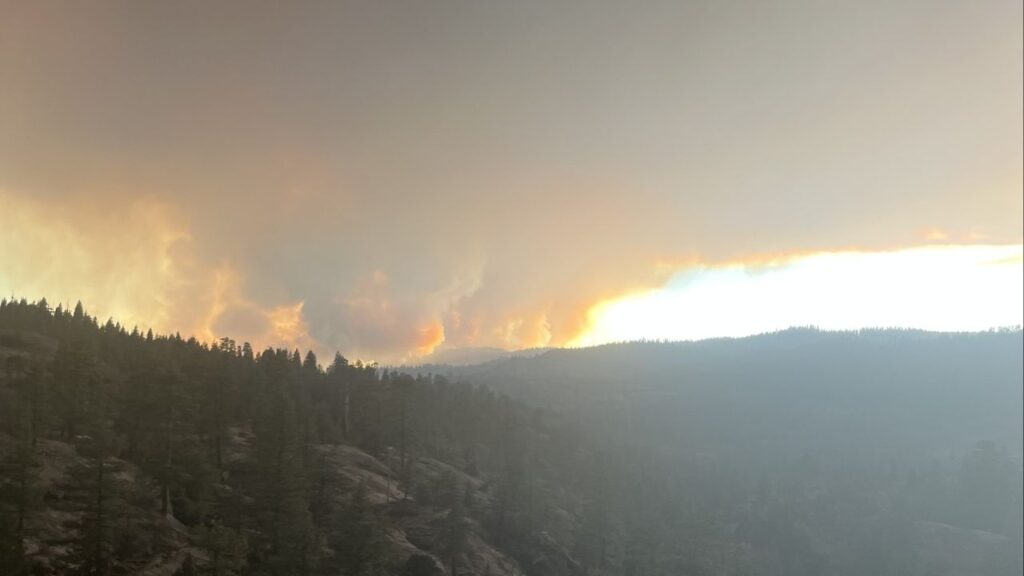Share
|
Getting your Trinity Audio player ready...
|
Six Western states that rely on water from the Colorado River have agreed on a model to dramatically cut water use in the basin, months after the federal government called for action and an initial deadline passed.
California — with the largest allocation of water from the river — is the lone holdout. Officials said the state would release its own plan.
The Colorado River and its tributaries pass through seven states and into Mexico, serving 40 million people and a $5 billion-a-year agricultural industry. Some of the largest cities in the country, including Los Angeles, Phoenix, Denver and Las Vegas, two Mexican states, Native American tribes and others depend on the river that’s been severely stressed by drought, demand and overuse.
States missed a mid-August deadline to heed the U.S. Bureau of Reclamation’s call to propose ways to conserve 2 million to 4 million acre feet of water. They regrouped to reach consensus by the end of January to fold into a larger proposal Reclamation has in the works.
Arizona, Nevada, New Mexico, Colorado, Utah and Wyoming sent a letter Monday to Reclamation, which operates the major dams in the river system, to outline an alternative that builds on existing guidelines, deepens water cuts and factors in water that’s lost through evaporation and transportation.
Those states propose raising the levels where water reductions would be triggered at Lake Mead and Lake Powell, which are barometers of the river’s health. The model creates more of a protective buffer for both reservoirs — the largest built in the U.S. It also seeks to fix water accounting and ensure that any water the Lower Basin states intentionally stored in Lake Mead is available for future use.
The modeling would result in about 2 million acre-feet of cuts in the Lower Basin, with smaller reductions in the Upper Basin. Mexico and California are factored into the equations, but neither signed on to Monday’s letter.
John Entsminger, general manager of the Southern Nevada Water Authority, said all states have been negotiating in good faith.
“I don’t view not having unanimity at one step in that process to be a failure,” he said late Monday. “I think all seven states are still committed to working together.”
California released a proposal last October to cut 400,000 acre feet. An acre foot is enough water to supply two to three U.S. households for a year.
JB Hamby, chair of the Colorado River Board of California, said California will submit a model for water reductions in the basin that is practical, based on voluntary action, and aligns with law governing the river and the hierarchy of water rights.
“California remains focused on practical solutions that can be implemented now to protect volumes of water in storage without driving conflict and litigation,” he said in a statement Monday.
Nothing will happen immediately with the consensus reached among the six states. However, not reaching a consensus carried the risk of having the federal government alone determine how to eventually impose cuts.
By not signing on, California doesn’t avoid that risk.
Contentious Debates
The debates over how to cut water use by roughly one-third have been contentious. The Upper Basin states of Wyoming, New Mexico, Colorado and Utah have said the Lower Basin states — Arizona, California and Nevada — must do the heavy lifting. That conversation in the Lower Basin has centered on what’s legal and what’s fair.
The six states that signed Monday’s proposal acknowledged ideas they put forth could be excluded from final plans to operate the river’s major dams. Negotiations are ongoing, they noted, adding that what they proposed does not override existing rights states and others have to the Colorado River.
“There’s a lot of steps, commitments that need to be made at the federal, state and local levels,” said Entsminger of Nevada.
Monday’s proposal included accounting for the water lost to evaporation and leaky infrastructure as the river flows through the region’s dams and waterways. Federal officials estimate more than 10% of the river’s flow evaporates, leaks or spills, yet Arizona, California, Nevada and Mexico have never accounted for that water loss.
The six states argued that Lower Basin states should share those losses — essentially subtracting those amounts from their allocations — once the elevation at Lake Mead sinks below 1,145 feet (349 meters). The reservoir was well below that Monday.
Reclamation will consider the six states’ agreement as part of a larger proposal to revise how it operates Glen Canyon and Hoover Dams — behemoth power producers on the Colorado River. The reservoirs behind the dams — Lake Powell and Lake Mead — have reached historic lows amid a more than two-decade-long drought and climate change.
Reclamation plans to put out a draft of that proposal by early March, with a goal of finalizing it by mid-August when the agency typically announces the amount of water available for the following year. Reclamation has said it will do what’s needed to ensure the dams can continue producing hydropower and deliver water.
Those annual August announcements have led to mandatory cuts for the past two years for Arizona, Nevada and Mexico in the river’s Lower Basin. California has so far been spared from cuts because it has some of the oldest and most secure water rights, particularly in the Imperial Valley where much of the country’s winter vegetables are grown, along with the Yuma, Arizona, region.
Without California’s participation, the six states’ proposal can only go so far to meet the hydrological realities of the river. Water managers in the Lower Basin say the scale of conservation Reclamation is seeking cannot be met without California, tribes and farmers who draw directly from the Colorado River.
Also unclear is how much Mexico eventually will contribute to the savings. In the best water years, Mexico receives its full allocation of 1.5 million acre feet under a treaty reached with the U.S. in 1944.
RELATED TOPICS:
Trump Says He Will Order Voter ID Requirement for Every Vote
16 hours ago
Greta Thunberg Joins Flotilla Heading for Gaza With Aid
16 hours ago
Chicago Mayor Says Police Will Not Aid Federal Troops or Agents
16 hours ago
Post-War Gaza Plan Sees Relocation of Population, ‘Digital Token’ for Palestinian Land: Washington Post
16 hours ago
Labor Day Quiz: Do You Know What a Knocker-Upper Is?
17 hours ago
Judge Blocks Pillar of Trump’s Mass Deportation Campaign
2 days ago
Visalia Driver Arrested for DUI After Multiple Crashes and Pedestrian Injured
2 days ago
Fresno County Garnet Fire Grows to 18,748 Acres in Sierra National Forest
16 hours ago
Categories

Fresno County Garnet Fire Grows to 18,748 Acres in Sierra National Forest

Israel Pounds Gaza City Suburbs, Netanyahu to Convene Security Cabinet

Trump Says He Will Order Voter ID Requirement for Every Vote

Greta Thunberg Joins Flotilla Heading for Gaza With Aid

Chicago Mayor Says Police Will Not Aid Federal Troops or Agents

Post-War Gaza Plan Sees Relocation of Population, ‘Digital Token’ for Palestinian Land: Washington Post











